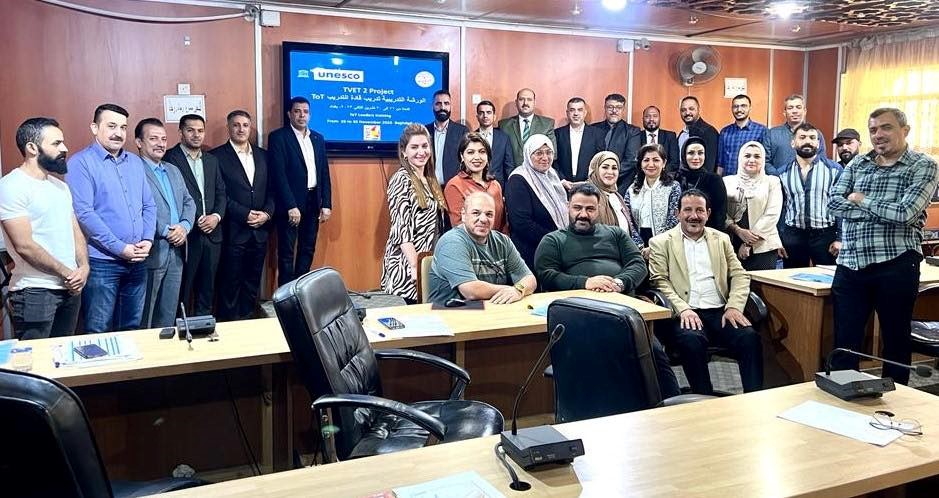العودة

UNESCO- Iraq's Ministry of Education transforming vocational education
اليونسكو
2024 - 01 - 22
UNESCO's Technical and Vocational Education and Training (TVET) programme, in collaboration with Iraq's Ministry of Education and supported generously by the EU, has played a pivotal role in enhancing vocational education and employability in the country. Focusing on five “Pilot” schools in Erbil, Mosul, Baghdad, Karbala, and Basra, the initiative aims to transform these institutions into Centers of Vocational Excellence.

UNESCO's Technical and Vocational Education and Training (TVET) programme, in collaboration with Iraq's Ministry of Education and supported generously by the EU, has played a pivotal role in enhancing vocational education and employability in the country. Focusing on five “Pilot” schools in Erbil, Mosul, Baghdad, Karbala, and Basra, the initiative aims to transform these institutions into Centers of Vocational Excellence.
Responding to the Directorate of Vocational Education's call for additional support, UNESCO extended its assistance beyond the original five schools. An inclusive workshop convened educators from diverse regions across Iraq for five days, exploring innovative education approaches. The workshop focused on enhancing trainer competences, adopting competency-based learning methods, and integrating Artificial Intelligence tools into curriculum development.
The workshop's interactive format, combining group discussions, microteaching sessions, and practical applications, fostered active engagement from participants. Notably, pre- and post-tests revealed a marked improvement in their knowledge and skills, demonstrating the workshop's effectiveness in achieving its intended learning outcomes.
This collective effort between UNESCO and the Directorate of Vocational Education seeks to empower educators and equip vocational schools with the necessary tools to prepare learners for future workforce challenges, contributing to the country's socio-economic progress.
أحدث المنشورات
القائمة الكاملةاليونسكو
المستقبل على المحك: لماذا الاستثمار في التعليم أمر بالغ الأهمية؟
يسلط هذا التقرير، الذي أعدّته اللجنة التوجيهية الرفيعة المستوى المعنية بالهدف الرابع من أهداف التنمية المستدامة (SDG4) بالتعاون مع الشراكة العالمية من أجل التعليم (GPE) ونُشر في عام 2024، الضوء على الحاجة المُلِحّة لتعزيز الاستثمار في التعليم كوسيلة أساسية لمواجهة التحديات العالمية، بما في ذلك تغيّر المناخ، والتطورات التكنولوجية، والتحوّلات الديموغرافية.
اليونسكو
المدن العربية تتألق في جوائز مدن التعلم لليونسكو لعام 2024
تُحرز المدن العربية تقدمًا كبيرًا في مجال التنمية المستدامة والتعلم مدى الحياة، مع تركيز متزايد على إنشاء بيئات تعليمية شاملة تُسهم في تحقيق الأهداف التنموية المحلية والعالمية. وقد احتفلت جوائز مدن التعلم لعام 2024، التي تُمنح من قِبَل اليونسكو، بهذه الجهود، مبرزةً المدن العربية التي تميزت في بناء مجتمعات تعليمية.
اليونسكو
مؤتمر اليونسكو العالمي الثالث للموارد التعليمية المفتوحة: تعزيز الوصول الشامل إلى المعرفة
انطلق مؤتمر اليونسكو العالمي الثالث للموارد التعليمية المفتوحة (OER) في 19 نوفمبر/تشرين الثاني 2024، في مركز دبي التجاري العالمي في دولة الإمارات العربية المتحدة، ليكون المرة الأولى التي يُستضاف فيها هذا الحدث في العالم العربي. نظّم مؤتمر اليونسكو بالتعاون مع مؤسسة محمد بن راشد آل مكتوم للمعرفة (MBRF)واستقطب أكثر من 500 مشارك ومشاركة من نخبة القادة العالميين، وصنّاع السياسات، وممثلي المؤسسات التعليمية، بما في ذلك وزراء، وأكاديميون، وخبراء من القطاع الخاص. وتركّزت المناقشات على مدار يومين حول تعزيز الاستفادة من الموارد التعليمية المفتوحة والتقنيات الناشئة، بهدف تحقيق وصول عادل وشامل إلى التعليم، وتقليص الفجوة الرقمية على الصعيد العالمي.
اليونسكو
الأمم المتحدة تحتفي في شهر ديسمبر/كانون الأول بحقوق الإنسان، والأشخاص ذوي الإعاقة، واللغة العربية
تُحيي الأمم المتحدة في شهر ديسمبر/كانون الأول ثلاث مناسبات بارزة تُعنى بحقوق الإنسان، وبحقوق الأشخاص ذوي الإعاقة، وباللغة العربيّة، ممّا يجعل هذا الشهر فرصةً عالميّةً للتفكير والعمل. وتقود اليونسكو الجهود لتعزيز التعليم الشامل، وحماية حقوق الإنسان، والاحتفاء بالإرث الثقافيّ واللغويّ للّغة العربيّة، من خلال سلسلة من الفعاليات والمبادرات.